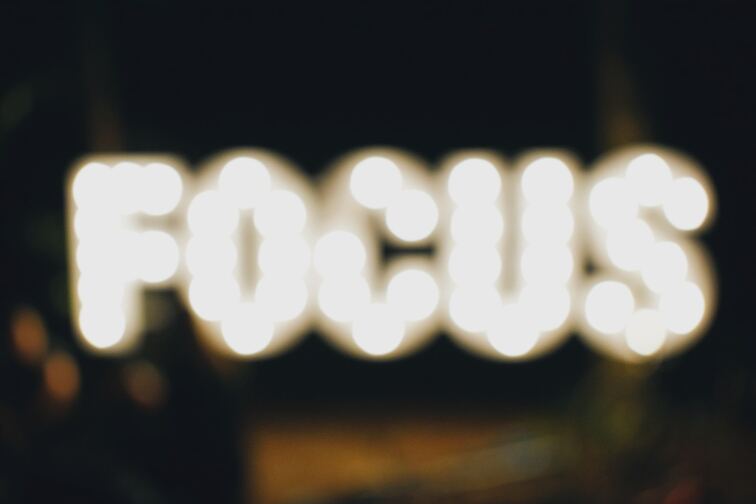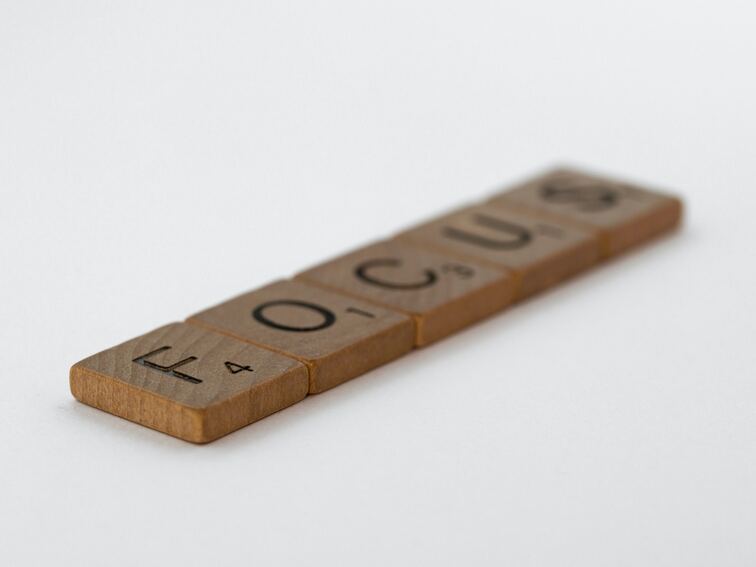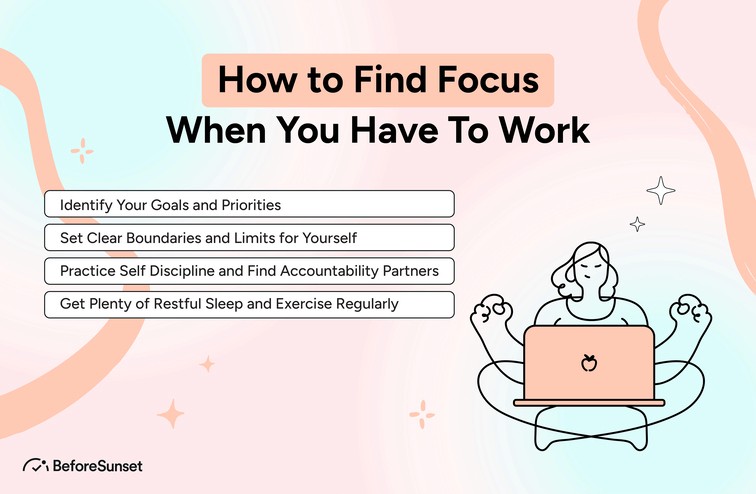It may be difficult to focus and be productive when the pressures of work are placed upon us, whether we are working in a regular office setting, a remote environment, or on personal projects. But it's a hurdle that can be overcome with the appropriate approaches and outlook.
In this blog post on "How to Find Focus When You Have to Work," we'll explore useful methods, pointers, and psychological insights that enable people to focus, avoid distractions, and reach their full potential at work.
The following advice is intended to help you regain your concentration and succeed in your professional pursuits, whether you're trying to meet deadlines, improve creativity, or simply find clarity in your everyday chores.

Types of Focus
One of the most important cognitive abilities in our everyday lives is the ability to focus. It gives us the ability to focus our mental effort and attention on particular tasks, objectives, or topics, enabling us to succeed in a variety of activities. However, concentration is not a universal term; it comes in a variety of forms, each of which is appropriate for a variety of circumstances and objectives.
Short-Term Focus
Short-term concentration, also known as "momentary" or "immediate" focus, is focusing your attention for a small amount of time on a particular job or aim. It is distinguished by a focused attention span that usually lasts only a few minutes to a few hours.
For jobs that require immediate attention and quick decisions, such as replying to emails, finishing a short-term project, or taking care of pressing concerns, short-term focus is essential. Although it may not need long-term planning or sustained attention over longer periods of time, this form of concentration enables people to devote their mental resources to complete tasks in a short amount of time.
Long-Term Focus
Long-term focus, often referred to as "sustained" or "extended" concentration, is the capacity to devote one's whole attention and commitment to a certain goal, project, or target for an extended period of time, which can last anywhere from weeks to years.
Long-term objectives are formed and worked toward with this type of focus, which frequently calls for patience, perseverance, and a calculated approach. In order to complete a multi-year project, pursue a degree, develop a successful profession, or fulfill personal desires like health or financial objectives, one must have a long-term focus.
Planning, flexibility, and the capacity to withstand failures and diversions are necessary for it, which will eventually result in the realization of significant accomplishments over time.

Ways to Find Focus
Our success in business, education, creativity, and personal development may all be attributed to our capacity to focus our attention with clarity and purpose in the face of constant distractions. Fortunately, despite the obstacles that contemporary life presents us with, there are many ways and approaches that may help us narrow our attention.
These techniques contain the secret to unlocking the power of focus, whether you're looking to succeed in your professional life, improve your academic achievement, or just find greater clarity and purpose in your daily duties.
Identify Your Goals and Priorities
Self-Reflection: Take time to reflect on your values, aspirations, and what truly matters to you. Consider both short-term and long-term goals in areas like career, personal development, relationships, health, and hobbies.
Set SMART Goals: Create specific, measurable, achievable, relevant, and time-bound (SMART) goals. This framework ensures that your objectives are well-defined and actionable.
Prioritize Your Goals: Once you've established your goals, prioritize them based on their importance and urgency. This helps you allocate your focus and resources accordingly.
Break Down Big Goals: Large or long-term goals can be overwhelming. Break them into smaller, manageable tasks or milestones to make progress more achievable and trackable.
Review and Adjust: Regularly review your goals and priorities to ensure they align with your evolving values and circumstances. Adjust them as needed to stay on course.
Keep a Planner or Journal: Maintain a planner or journal to document your goals, track progress, and jot down thoughts and ideas related to your priorities. This can help you stay organized and focused.
Limit Distractions: Identify distractions and time-wasting activities that divert your attention from your goals. Develop strategies to minimize or eliminate these distractions.

Set Clear Boundaries and Limits for Yourself
Maintaining concentration and balance in your life requires that you set clear limitations and boundaries for yourself. It entails deciding what demands on your time, effort, and resources you will and won't endure.
By setting boundaries, you may protect your well-being and focus on your objectives without continuously giving in to temptations to multitask or overcommit. By setting these rules, you make your wants and values clear to others and construct a framework that helps you maintain your attention on what's important.
Clear limits offer the framework for keeping focus and completing your objectives while protecting your physical and emotional health, whether it's setting boundaries for your work hours, limiting your screen time, or saying "no" to unreasonable expectations.
Practice Self Discipline and Find Accountability Partners
Maintaining concentration and balance in your life requires that you set clear limitations and boundaries for yourself. It entails deciding what demands on your time, effort, and resources you will and won't endure.
By setting boundaries, you may protect your well-being and focus on your objectives without continuously giving in to temptations to multitask or overcommit. By setting these rules, you make your wants and values clear to others and construct a framework that helps you maintain your attention on what's important.
Clear limits offer the framework for keeping focus and completing your objectives while protecting your physical and emotional health, whether it's setting boundaries for your work hours, limiting your screen time, or saying "no" to unreasonable expectations.

Get Plenty of Restful Sleep and Exercise Regularly
Your capacity to focus will be greatly impacted by two crucial habits: getting lots of good sleep and exercising frequently.
The ability of your brain to regenerate and replenish while you sleep is essential for improving cognitive abilities including memory, concentration, and problem-solving. Without enough sleep, it becomes harder for you to focus, and you are more prone to interruptions and lower productivity. To ensure that your mind remains clear and attentive, aim for 7-9 hours of decent sleep each night.
Regular exercise is crucial since it not only enhances physical health but also significantly impacts mental health. Stress is reduced and endorphins that improve mood are released during exercise. These advantages can improve your capacity to focus, foster creativity, and have an optimistic outlook. Include at least 75 minutes of strenuous exercise or 150 minutes of aerobic activity at a moderate level per week.
Your physical and mental health may be improved by incorporating these techniques into your daily life, giving you a solid basis for prolonged attention and productivity.
Make Time for Relaxation and Reflection
Maintaining attention and general well-being requires scheduling time for thought and relaxation. It's simple to become overwhelmed by the everyday craziness and lose focus on your priorities. You may unwind, alleviate tension, and replenish your emotional and mental energy by relaxing.
You may assess your objectives and priorities, gain perspective, and make the necessary changes to your plans when things are calm. Relaxation gives you the mental room to unwind, nurture creativity, and come back to your responsibilities with fresh concentration and clarity.
This mental space can be achieved through meditation, leisure pursuits, nature excursions, or even just quiet time alone. It is essential for maintaining sustained attention and attaining your goals to prioritize these times of rest and contemplation.
Create a Dedicated Workspace or Environment
A practical way to improve your attention and productivity is to designate a specific workstation or setting. Having a dedicated space for these activities may have a big influence on your capacity to focus, whether you're working, learning, or pursuing a creative pursuit. Here is why it's important:
Reduce Distractions: Having a dedicated workstation makes it easier for you to stay on target and retain focus by reducing interruptions and distractions.
Psychological Association: Entering your office causes a psychological link with work or study, which makes it simpler to shift into a concentrated frame of mind.
Organization: By encouraging greater organization of your materials, equipment, and resources, a dedicated workplace may cut down on the time you spend looking for what you need.
Comfort and Ergonomics: By designing your office for comfort and ergonomics, you may ensure that you're physically at ease and less likely to become distracted by physical discomfort.
Boundary Setting: Setting clear boundaries between work, school, and personal time will help you keep a healthy work-life balance.
Consistency: Utilizing the same area often might create a pattern that strengthens concentration and productivity.
Minimize Interruptions by Turning off Notifications & Reminders
A proactive approach to protect your concentration and productivity is to minimize disruptions by turning off notifications and reminders. Constant notifications from cell phones, emails, and social networking platforms may dilute your focus and interfere with your production in today's digitally linked world.
You can regulate the atmosphere so that you can focus intently on your job when you purposefully turn off these distractions. This distraction-free space encourages higher-quality work, increases efficiency, and improves cognitive flow.
Additionally, it promotes attention and presence throughout your tasks, which lessens the cognitive strain of multitasking and promotes a more tranquil and effective work or study environment. By taking charge of your notifications, you reclaim the ability to focus your attention on the things that really important, which will eventually boost productivity and improve work-life balance.
BeforeSunset Can Help You Focus
By using BeforeSunset, you can improve your productivity and focus. So, don't wait – sign up for this productivity tool today and start going the extra mile!


